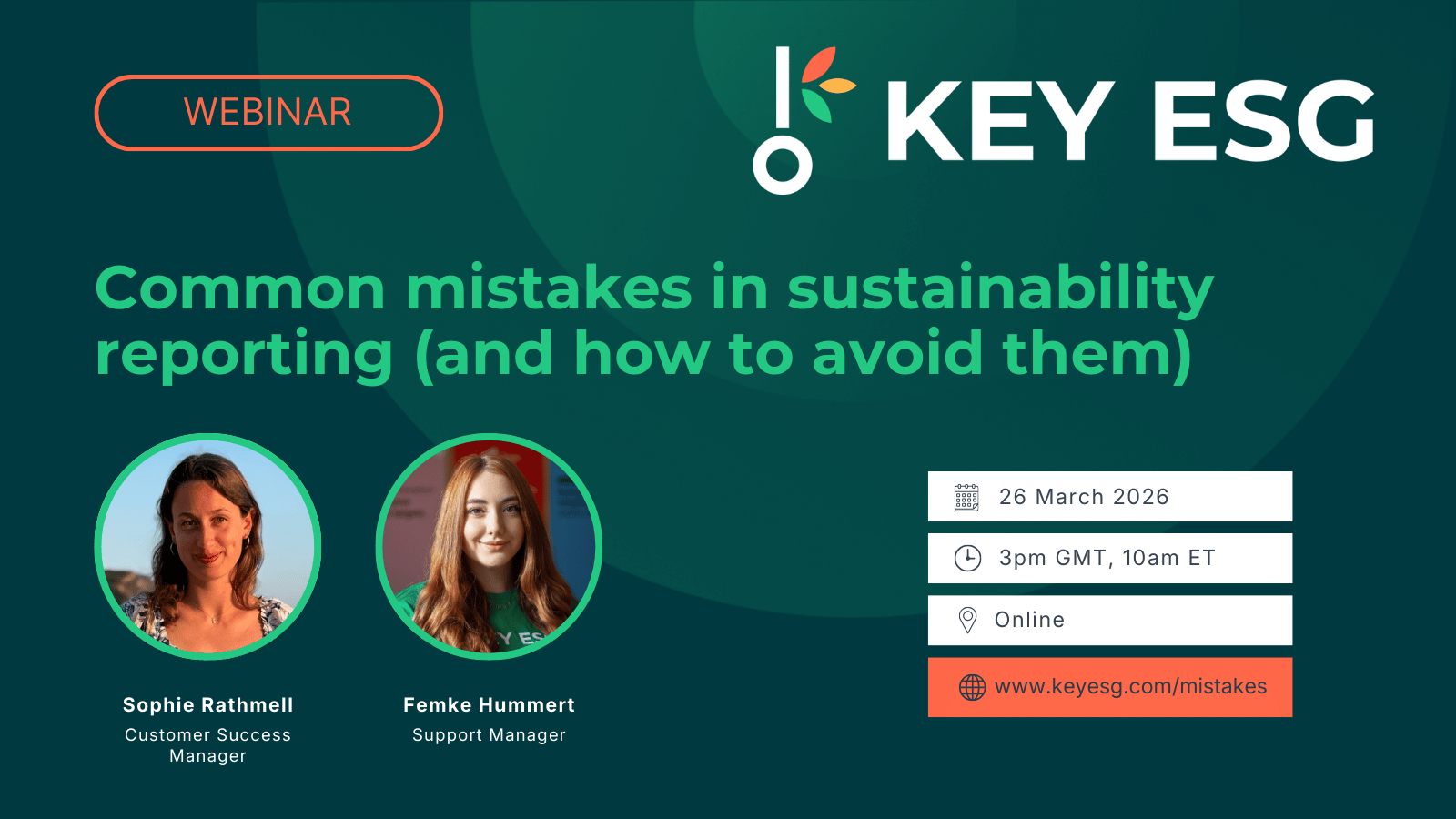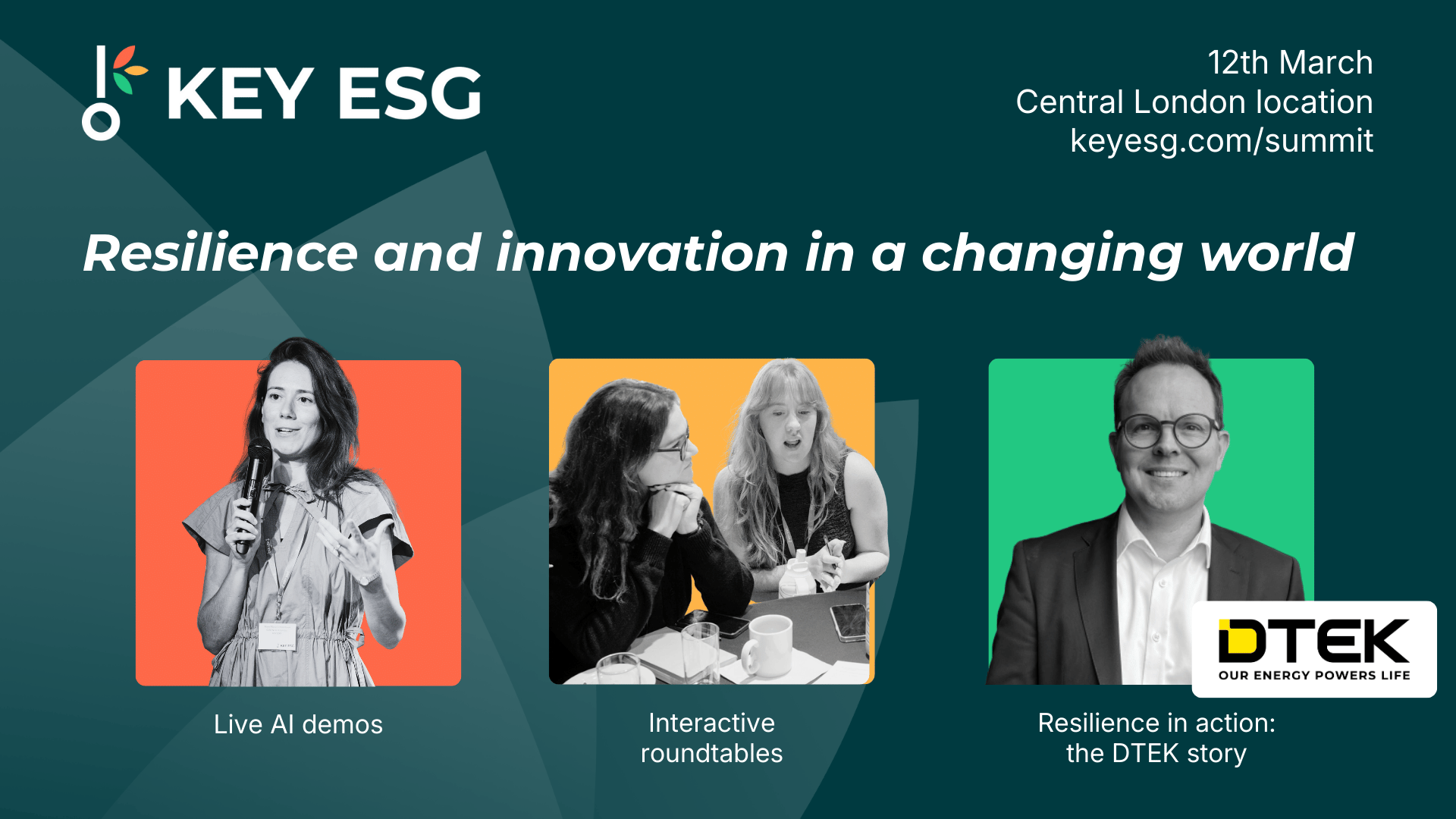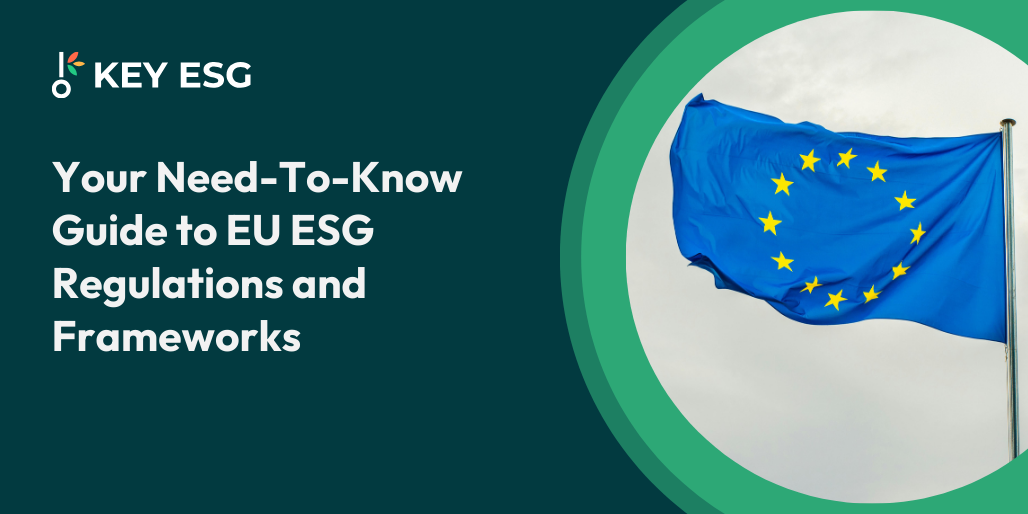The ESG Data Convergence Initiative (EDCI) is an initiative launched last year by CalPERS and Carlyle in an attempt to standardise ESG reporting. The EDCI champions the industry-wide efforts made to streamline the ways in which ESG data is collected and reported. Consistency and replicability in ESG reporting allow metrics to remain comparable. This means that fund managers can compare data between different portfolio companies, and regulators can compare data within any given sector.
To date, over 240 general and limited partners adhere to EDCI principles, and 2000 portfolio companies are included in the benchmark. This number is continuing to grow as ESG reporting becomes more important and disclosure requirements become more demanding.
Anne-Marie Schoonbeek, Chief Operating Officer at KEY ESG, recently interviewed Julia Jaskólska, Lead of Co-Investments and Environmental, Social, and Governance (ESG) at CalPERS Private Equity.
Julia spoke to Anne-Marie about the origins of the EDCI. They discussed the relevance of EDCI standards and how software can help private equity firms and venture capitalists adhere to EDCI guidance.
What was the origin behind EDCI?
"The genesis of this project was a disconnect. We saw a number of our general partners (GPs) actively engaging with ESG factors within their portfolio companies and driving impactful changes. And yet, as a limited partner (LP), we were unable to make sense of that.
It is impossible to make sense of stories and experiences at scale, and we, therefore, needed numbers. For GPs, the number of differently defined ESG LP requests trying to understand the same ESG areas was overwhelming.
We partnered with Carlyle on the GP side, and we set out to see if we could converge on the same set of quantitative ESG metrics. GPs and LPs alike can benefit from having a well-defined set of ESG factors. This helps to demonstrate the evolution of performance on these important factors over time."
How will the list of ESG metrics included in the EDCI framework evolve over time, and how often?
"We get together once a year for a sprint to review existing metrics alongside feedback from EDCI members. We also consider adding new ones.
For example, this first year, we decided to look deeper into diversity and include the share of women in a company’s C-suite. Previously, we only looked at board level. While ambition around adding new metrics is important, our primary goal is pragmatism and establishing what is feasible. We want to focus on driving high reporting rates around existing metrics before adding too many new metrics."
Which type of Private Equity or Venture Capital firm do you think the EDCI standards are best suited for?
"We designed the metrics with buyout firms in mind. Our goal was to establish a common foundation, no matter how early or advanced a buyout fund is on their ESG journey.
We wanted to identify a few meaningful metrics in a clear way, so that lower middle market firms that might not have the same resources as large buyout firms could participate. We did not focus on Venture Capital (VC) funds, as we recognised that non-majority ownership makes it more difficult to obtain metrics from portfolio companies.
To our surprise, we found that a lot of VC managers joined. They started using EDCI because they found it valuable, which we were thrilled to hear!
We remain focused on private equity (PE) buyout today, but we have had one working group focused on private credit’s convergence. This project has produced some valuable outcomes, so venture could be the next logical extension."
If I am a specialist fund manager, are the EDCI standards relevant? Or should I focus on ESG metrics unique and material to my industry?
"We expect managers closest to the companies to choose and focus on the areas of ESG that are most material. Managers should drive improvement in these areas, while reporting on all ESG factors – just like a growth-focused investment would still report on costs.
We view reporting on EDCI metrics as good operating practice for all managers. However, we appreciate that specialist managers might find additional metrics more relevant to their operations. We support these managers when it comes to driving improvements around metrics not reflected in EDCI today."
How does EDCI engage with fund managers’ portfolio companies for their feedback on the EDCI methodology?
"Our Steering Committee is made up of an equal number of GPs and LPs. GPs are the direct points of engagement with portfolio companies. All EDCI members can provide feedback through several channels, such as feedback surveys, focus groups, and through direct outreach to the EDCI team.
Ahead of the Steering Committee metrics sprint, opportunities were made available for managers to provide feedback through a survey or through focus groups. There was also a call for feedback from all participating GPs and LPs on the shortlist of potential changes that emerged from the sprint. We plan to continue this iterative model of participant engagement. And portfolio companies can always reach out to the EDCI team directly at: info@esgdc.org."
What do you see as key challenges for fund managers looking to successfully adopt EDCI across their portfolio?
"Setting up any form of consistent reporting, but in particular ESG reporting, often requires external vendors (e.g. emissions data). This is a lot of work and, given the relative nascency of the ESG reporting industry, it can be confusing and overwhelming.
This is why working with great partners who make it easier helps a lot. We appreciate this. We are therefore making a special effort with regard to reporting coverage, encouraging GPs to just start somewhere today. Even if these efforts don't encompass their entire portfolios just yet.
There are also concerns around data security and privacy, which we fully appreciate as ESG data is very sensitive. We began our initiative by partnering with a top professional services firm in the industry (BCG) to handle ESG data with great care.
We plan to evolve practices and communications around security, privacy, and data ownership to increase comfort levels around sharing ESG data in private equity."
What role can ESG software play in helping more fund managers adopt EDCI?
"We can see it being tremendously helpful in saving time and bringing expertise around certain metrics that might be hard for GPs and portfolio companies to have in-house (e.g emissions reporting).
Making it as easy for portfolio companies to report as possible should be in any GP’s best interest – any time saved reporting is better spent driving value within the business.
How KEY ESG can help fund managers
KEY ESG's intuitive software streamlines and automates data collection, calculations, and reporting. The user-friendly interface provides high-quality EDCI datasets, allowing fund managers to assess data from across their entire portfolio.
All information recorded adheres to EDCI methodologies and is reliable, comparable, and standardised. As EDCI guidelines evolve, so does KEY ESG's software. Updates are made via the cloud, and these are automatically reflected in your calculations.
KEY ESG offers free software demos for fund managers looking to optimise their ESG strategies. Get in touch to request your demo!
The ESG Data Convergence Initiative (EDCI) is an initiative launched last year by CalPERS and Carlyle in an attempt to standardise ESG reporting. The EDCI champions the industry-wide efforts made to streamline the ways in which ESG data is collected and reported. Consistency and replicability in ESG reporting allow metrics to remain comparable. This means that fund managers can compare data between different portfolio companies, and regulators can compare data within any given sector.
To date, over 240 general and limited partners adhere to EDCI principles, and 2000 portfolio companies are included in the benchmark. This number is continuing to grow as ESG reporting becomes more important and disclosure requirements become more demanding.
Anne-Marie Schoonbeek, Chief Operating Officer at KEY ESG, recently interviewed Julia Jaskólska, Lead of Co-Investments and Environmental, Social, and Governance (ESG) at CalPERS Private Equity.
Julia spoke to Anne-Marie about the origins of the EDCI. They discussed the relevance of EDCI standards and how software can help private equity firms and venture capitalists adhere to EDCI guidance.
What was the origin behind EDCI?
"The genesis of this project was a disconnect. We saw a number of our general partners (GPs) actively engaging with ESG factors within their portfolio companies and driving impactful changes. And yet, as a limited partner (LP), we were unable to make sense of that.
It is impossible to make sense of stories and experiences at scale, and we, therefore, needed numbers. For GPs, the number of differently defined ESG LP requests trying to understand the same ESG areas was overwhelming.
We partnered with Carlyle on the GP side, and we set out to see if we could converge on the same set of quantitative ESG metrics. GPs and LPs alike can benefit from having a well-defined set of ESG factors. This helps to demonstrate the evolution of performance on these important factors over time."
How will the list of ESG metrics included in the EDCI framework evolve over time, and how often?
"We get together once a year for a sprint to review existing metrics alongside feedback from EDCI members. We also consider adding new ones.
For example, this first year, we decided to look deeper into diversity and include the share of women in a company’s C-suite. Previously, we only looked at board level. While ambition around adding new metrics is important, our primary goal is pragmatism and establishing what is feasible. We want to focus on driving high reporting rates around existing metrics before adding too many new metrics."
Which type of Private Equity or Venture Capital firm do you think the EDCI standards are best suited for?
"We designed the metrics with buyout firms in mind. Our goal was to establish a common foundation, no matter how early or advanced a buyout fund is on their ESG journey.
We wanted to identify a few meaningful metrics in a clear way, so that lower middle market firms that might not have the same resources as large buyout firms could participate. We did not focus on Venture Capital (VC) funds, as we recognised that non-majority ownership makes it more difficult to obtain metrics from portfolio companies.
To our surprise, we found that a lot of VC managers joined. They started using EDCI because they found it valuable, which we were thrilled to hear!
We remain focused on private equity (PE) buyout today, but we have had one working group focused on private credit’s convergence. This project has produced some valuable outcomes, so venture could be the next logical extension."
If I am a specialist fund manager, are the EDCI standards relevant? Or should I focus on ESG metrics unique and material to my industry?
"We expect managers closest to the companies to choose and focus on the areas of ESG that are most material. Managers should drive improvement in these areas, while reporting on all ESG factors – just like a growth-focused investment would still report on costs.
We view reporting on EDCI metrics as good operating practice for all managers. However, we appreciate that specialist managers might find additional metrics more relevant to their operations. We support these managers when it comes to driving improvements around metrics not reflected in EDCI today."
How does EDCI engage with fund managers’ portfolio companies for their feedback on the EDCI methodology?
"Our Steering Committee is made up of an equal number of GPs and LPs. GPs are the direct points of engagement with portfolio companies. All EDCI members can provide feedback through several channels, such as feedback surveys, focus groups, and through direct outreach to the EDCI team.
Ahead of the Steering Committee metrics sprint, opportunities were made available for managers to provide feedback through a survey or through focus groups. There was also a call for feedback from all participating GPs and LPs on the shortlist of potential changes that emerged from the sprint. We plan to continue this iterative model of participant engagement. And portfolio companies can always reach out to the EDCI team directly at: info@esgdc.org."
What do you see as key challenges for fund managers looking to successfully adopt EDCI across their portfolio?
"Setting up any form of consistent reporting, but in particular ESG reporting, often requires external vendors (e.g. emissions data). This is a lot of work and, given the relative nascency of the ESG reporting industry, it can be confusing and overwhelming.
This is why working with great partners who make it easier helps a lot. We appreciate this. We are therefore making a special effort with regard to reporting coverage, encouraging GPs to just start somewhere today. Even if these efforts don't encompass their entire portfolios just yet.
There are also concerns around data security and privacy, which we fully appreciate as ESG data is very sensitive. We began our initiative by partnering with a top professional services firm in the industry (BCG) to handle ESG data with great care.
We plan to evolve practices and communications around security, privacy, and data ownership to increase comfort levels around sharing ESG data in private equity."
What role can ESG software play in helping more fund managers adopt EDCI?
"We can see it being tremendously helpful in saving time and bringing expertise around certain metrics that might be hard for GPs and portfolio companies to have in-house (e.g emissions reporting).
Making it as easy for portfolio companies to report as possible should be in any GP’s best interest – any time saved reporting is better spent driving value within the business.
How KEY ESG can help fund managers
KEY ESG's intuitive software streamlines and automates data collection, calculations, and reporting. The user-friendly interface provides high-quality EDCI datasets, allowing fund managers to assess data from across their entire portfolio.
All information recorded adheres to EDCI methodologies and is reliable, comparable, and standardised. As EDCI guidelines evolve, so does KEY ESG's software. Updates are made via the cloud, and these are automatically reflected in your calculations.
KEY ESG offers free software demos for fund managers looking to optimise their ESG strategies. Get in touch to request your demo!






